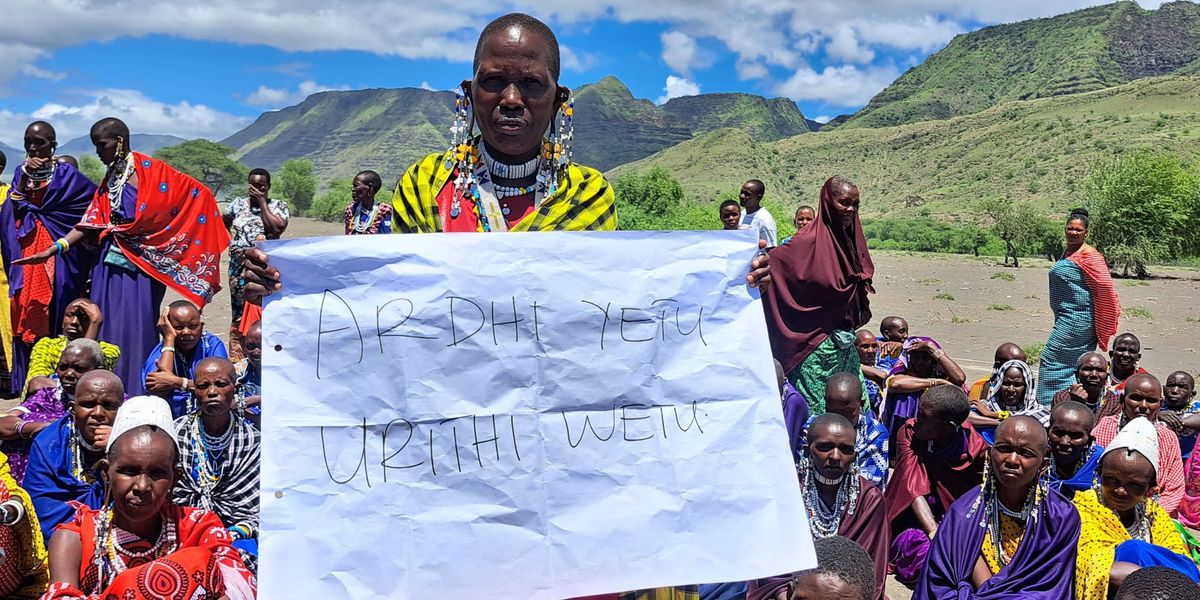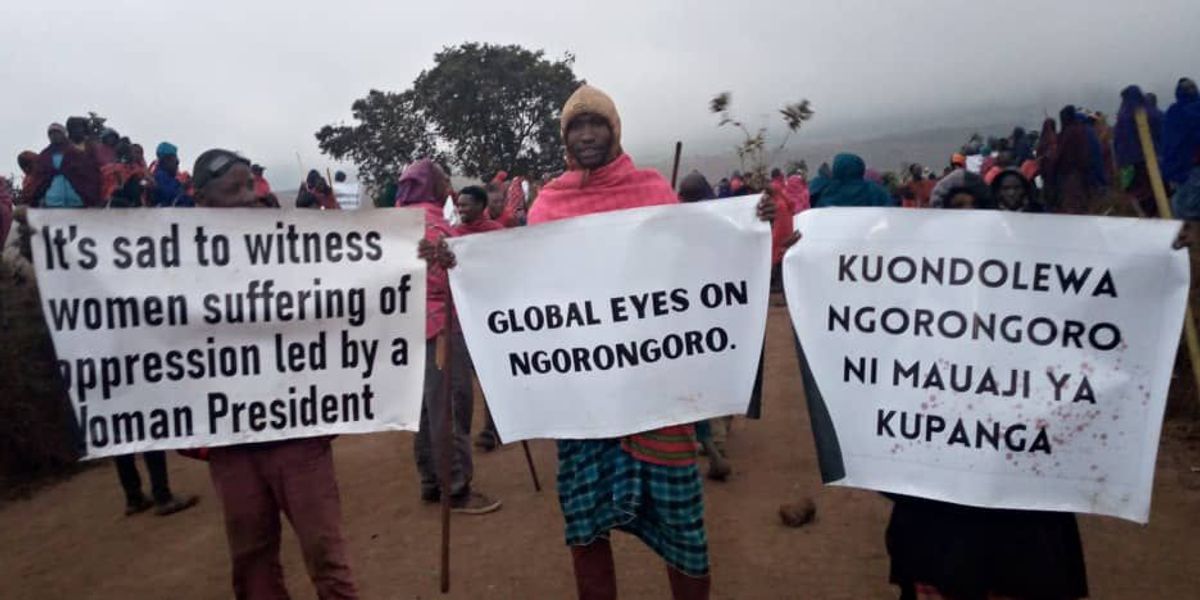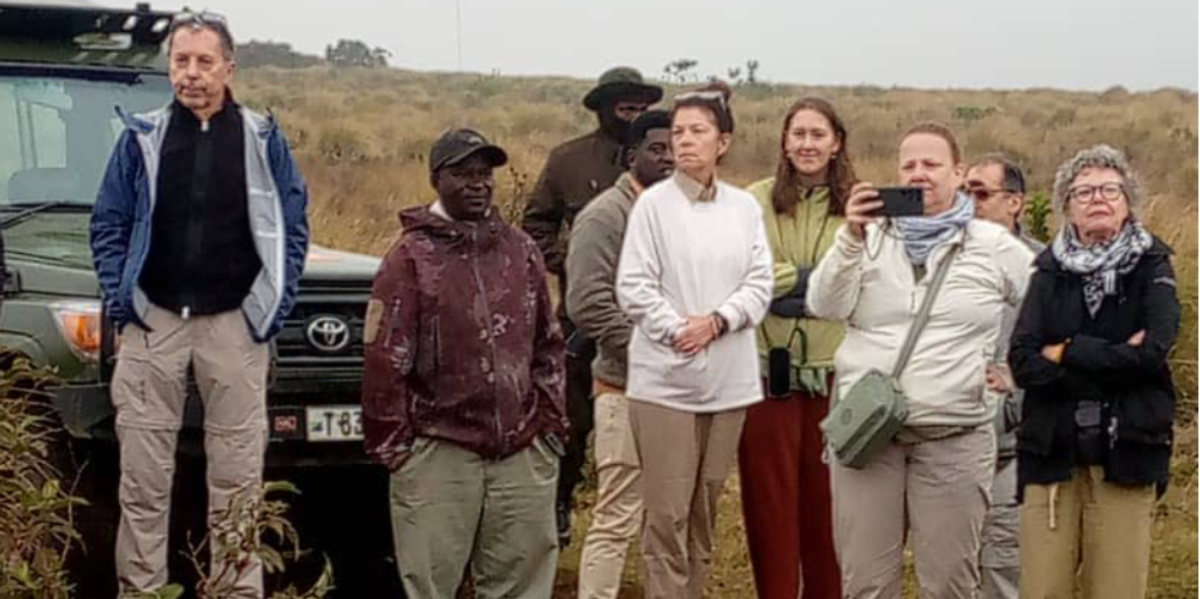

SUBSCRIBE TO OUR FREE NEWSLETTER
Daily news & progressive opinion—funded by the people, not the corporations—delivered straight to your inbox.
5
#000000
#FFFFFF
To donate by check, phone, or other method, see our More Ways to Give page.


Daily news & progressive opinion—funded by the people, not the corporations—delivered straight to your inbox.
UNESCO must abandon its support for a conservation model that annihilates Indigenous peoples; it should begin by de-listing sites where human rights abuses occur.
I stand, mesmerized by the landscape. Distant mountains are cloaked in every shade of green, and a clear, still lake reflects the sky. The deep amber sunset lights the golden script carved into the wooden sign: Kaeng Krachan National Park.
Nearby, a young couple captures the moment in a selfie—a postcard from paradise, one of Thailand’s World Heritage Sites.
“Not there... there!” Kai, our guide, tugs my arm, and points to a spot by the river. “That’s where they found part of Billy’s body.” And, just like that, my reverie breaks.
For many Indigenous people, their lands declared as World Heritage Sites morph into alien territories, belonging not to them, but to “all the peoples of the world”—especially the fee-paying tourists.
Pholachi “Billy” Rakchongcharoen was an Indigenous Karen activist. He was collecting honey when he was arrested by park officials and vanished. Five years later, pieces of his skull surfaced in a drum under a bridge—right here in paradise. Billy was just 30, about the same age as those young selfie takers.
Later, we meet Menor, his widow. Her eyes heavy with sorrow, she says, “Why do we need a World Heritage Site on our ancestral land? It never gives the community any benefits. It just takes things away from us.”
This landscape, hailed by UNESCO for its “outstanding value to all humanity,” is home to a tragedy. And the Karen people, its true custodians, are its victims. The Karen practice rotational agriculture—where different plots of land are used over successive years and then left fallow for up to a decade. Essentially, they prepare a new area for planting by using controlled fires, which enrich the soil and enhance biodiversity. All of this is accompanied by rituals and ceremonies to honor the Earth, their food provider. Since colonial times, conservationists, blind to this harmony, branded it pejoratively as “slash and burn.”
In 1996, the Karen of Bang Kloi village were evicted by the government under the guise of protecting the park. They resisted. Billy was one of them—until his voice was silenced.
Inspired by Billy and his grandfather, the indomitable Ko-ee who died aged 107 after a lifetime of resistance, the Karen of Bang Kloi reclaimed their territory in 2020, only to be violently expelled again. Despite this grim history, despite the pleas of three United Nations special rapporteurs to address human rights concerns before the designation, UNESCO assigned the Kaeng Krachan Forest Complex (KKFC) World Heritage Site (WHS) status in 2021. The accolade was in the category “natural criteria,” defined as a “significant natural habitat for in-situ conservation of biological diversity.”
But despite the beliefs of UNESCO experts and tourists, the Kaeng Krachan habitat did not occur naturally. The landscape was sculpted and nurtured by Indigenous people for generations. As one Karen man pointed out, “The WHS staff only see the forest and animals; they don’t see the people. They don’t see us. It’s a kind of blindness.”
Another Karen voice added bluntly, “KKFC becoming a WHS is a serious violation of human rights.”
Since its designation as a World Heritage Site there’s been an increase in harassment and arrests, and a tightening of restrictions. Karen people said that the World Heritage status meant that attempts to force everyone out of the forest “have got worse”.
This isn’t just a Thai tragedy. It’s a global one. Human rights investigations have documented torture, rape, and killings of Indigenous people in “natural” World Heritage Sites—especially in Asia and Africa. These sites, celebrated for their beauty and ecological importance, become war zones for the locals. Governments and NGOs, armed with UNESCO’s blessing, push the Indigenous people out and blame them for the degradation of what they have long protected.
Countries crave UNESCO’s nod. It brings prestige, tourists, funding. But for those evicted, it’s a nightmare.
In my travels with Survival International, the global movement for Indigenous peoples’ rights, I’ve seen these “wonders of the world.” The Serengeti’s vast plains, Odzala’s shadowy Congo forests, India’s tiger reserves, Yosemite’s grandeur—all share a dark secret. The pristine wilderness tourists adore is soaked with Indigenous blood, sweat, and tears. These landscapes were their homes, sustained by their knowledge and practices until outsiders decided they were “wild nature,” needing protection from the very people who understood them best. It’s colonialism masquerading as conservation.
For many Indigenous people, their lands declared as World Heritage Sites morph into alien territories, belonging not to them, but to “all the peoples of the world”—especially the fee-paying tourists.
We need to put this conservation model on trial, just as we did with other unjust, outdated, and harmful ideas—racial segregation, gender inequality. The true protectors of our shared natural heritage are Indigenous peoples. Their ways of life are sustainable, rooted in providing for future generations. For them, nature is home, the foundation of life and survival. They are the best stewards of the natural world. As one group of Karen declared, defiant despite the years of oppression: “If we don’t fight today, there will be no future for our children.”
UNESCO must abandon its support for a conservation model that annihilates Indigenous peoples. It should begin by de-listing sites where human rights abuses occur. Only then can it begin to decolonize itself—and genuinely protect our planet.
If designating areas as World Heritage Sites endangers the survival of Indigenous peoples in African countries, UNESCO and IUCN’s outdated, colonial, and top-down approach to conservation must be dismantled immediately.
In the early morning of August 18, the safari cars that usually creep along the Ngorongoro-Serengeti highway, slowed by their sheer numbers, encountered a different challenge. Thousands of Maasai men and women, draped in red-patterned Shuka cloth and waving grass, a symbol of peace, were blocking the highway.
They were staging a peaceful protest against the Tanzanian government’s latest ruthless attempt to forcibly evict them from their ancestral lands. The police, wary of using violence in front of international tourists as they had in neighboring Loliondo in 2022, resorted to intimidation tactics instead, blocking vehicles carrying food and water from Karatu to the Ngorongoro Conservation Area (NCA) to weaken the resolve of the demonstrators.
“We are not blocking this highway out of choice. We are doing it for necessity. For too long our voices have been ignored, and out rights have been trampled. This is our last resort.”—Statement of the Maasai Community, NCA, August 18, 2024

A Maasai woman holds a sign reading, “This is our ancestral land.” (Photo: The Maasai elders, NCA)
Since Tanzania’s colonizers established the Serengeti National Park in 1951—displacing Indigenous residents to Loliondo and the Ngorongoro Conservation Area (NCA)—the pastoralist Maasai in Northern Tanzania have faced relentless struggles against evictions and human rights abuses. For the past four years, their resilience has endured brutal attacks designed to expel them from their ancestral lands, transforming the region into a people-free zone to enhance safari tourism and hunting, as glorified in Western media like Planet Earth. These atrocities are masked as environmental conservation and protection.
In April 2021, the Tanzanian government announced the Multiple Land Use Management Plan (MLUM), posing a grave threat to the Maasai’s survival in the NCA. This followed the March 2019 joint monitoring mission by the UNESCO World Heritage Centre (WHC), the International Union for Conservation of Nature (IUCN), and the International Council on Monuments and Sites (ICOMOS), which urged the government to control population growth in the NCA. The government responded by prioritizing tourism revenue, enacting the MLUM and a resettlement plan that expanded the NCA from 8,100 square kilometers to 12,083 square kilometers and created new restricted areas. In essence, this condemned nearly 80,000 Maasai to lives of destitution or death through forced evictions and the destruction of their livelihoods.
“The evictions and restrictions constraining tens of thousands of livelihoods are not about ensuring conservation but about expanding tourism revenues within the World Heritage Site. Tourism within the NCA has exploded in recent years with the number of annual tourists increasing from 20,000 in 1979 to 644,155 in 2018, making it one of the most intensively visited conservation areas in Africa. The number soared to 752,215 in 2023.”—The Oakland Institute

Maasai mobilize for their political rights. (Photo: The Maasai elders, NCA)
In response to international condemnation, the government falsely claimed that Maasai were volunteering en masse for resettlement at two relocation sites—Msomera village in Handeni district and Kitwai A and B villages in Simanjiro district. The flawed resettlement plans forced 11,000 Maasai community members from the NCA to send a letter to the government and its main donors stating their demand to remain in the NCA.
“This is not the first time that we are fighting to secure our rights and protect the lives of our people—we need a permanent solution and we need it now. We will not leave; Not Now, Not Ever!”—A Letter from Maasai Community to Tanzanian Government & International Donors, 2022
Despite the government’s claims that the Maasai’s relocation is voluntary, they have been forcibly uprooted by a systematic denial of essential social services, including education and healthcare. In May 2024, the government slashed nearly half of the budget for Endulen community hospital, the main healthcare provider for nearly 100,000 Maasai pastoralists in the NCA. These cuts ended vital support for facility repairs and community health initiatives. The grounding of the Flying Medical Service in 2022, after 39 years of critical emergency care, left over 24,000 children unvaccinated, deprived more than 5,700 pregnant women of necessary medical attention, and halted the delivery of life-saving HIV medications. While no official count of fatalities exists, it is undeniable that lives have been lost as a result.

Maasai hold protest signs on the Serengeti-Ngorongoro highway. (Photo: The Maasai elders, NCA)
In August, after failing to forcibly remove the Maasai from the NCA, the government struck a severe blow to their political rights. Ngorongoro Division was removed from the voters’ register, disenfranchising tens of thousands of Maasai pastoralists ahead of the upcoming local and general elections in 2025. Those registered to vote saw their polling station moved hundreds of miles away to Msomera village—the site of their forced relocation—effectively stripping even more Maasai villagers of their right to vote.
Adding to this assault on their political rights, Government Notice (GN) 673, issued on August 2, 2024, delisted 11 wards, 25 villages, and 96 subvillages in Ngorongoro Division, affecting over 110,000 people, all without obtaining their Free, Prior, and Informed Consent. This blatant violation of their rights sparked the August 18 protest, where Maasai residents demanded the reversal of GN 673 and the restoration of their electoral rights by the National Electoral Commission.
“We urge the Minister of Local Government to revoke and cancel Government Notice No. 673 of 2024, as it violates the constitution, laws, and international and regional treaties that Tanzania has signed and ratified.”—Onesmo Olengurumwa, National Coordinator, Tanzania Human Rights Defenders Coalition
As images of the Maasai, armed with grass and placards, demanding justice, went viral on August 22, 2024, the Arusha High Court temporarily suspended GN 673, pending further instructions. However, community lawyers have condemned the ruling as a sham. The court’s decision followed an injunction supposedly filed by Ngorongoro resident Isaya Ole Posi, who denies any involvement. Allegations have surfaced that the government paid the lawyer who filed the injunction against itself, in a calculated move to divert international attention sparked by the protests.

Stranded tourists stand watching the Maasai protests. (Photo: The Maasai elders, NCA)
While the Tanzanian government must undoubtedly be held accountable for violating the rights of its citizens, we must also scrutinize the role of two other key actors. The first are international conservation bodies like UNESCO, IUCN, and ICOMOS, under whose influence the government’s Multiple Land Use Model (MLUM) and resettlement plan were developed. It took an extensive global campaign to shift their stance. UNESCO’s website carries the government’s February 2024 report on the conservation status in the NCA, providing the false narrative that the relocation of local communities is voluntary, adheres to international best practices, and includes compensation measures. Yet, it also notes ongoing concerns from local communities, acknowledging the need for a human rights-based approach.
If designating areas like the NCA as World Heritage Sites endangers the survival of Indigenous peoples in African countries, UNESCO and IUCN’s outdated, colonial, and top-down approach to conservation—while boosting tourism—must be dismantled immediately. These institutions have reluctantly admitted that the NCA’s multiple land use model is appropriate, rather than altering its protected area category with disastrous consequences for residents. However, they have ignored calls for the NCA to be delisted from World Heritage sites and failed to pressure the government to stop its human rights violations.
As for the international tourists who continue to flock to Tanzania, lured by the chance to witness the “Big Five” or hunt trophies, the August 18 protests should serve as a wake-up call. The Maasai protesters and their global supporters have made their message clear: This is no longer a scene from “Out of Africa.” If there is no respect for Indigenous lives, then it must be “Tourism out of Tanzania!”
"If nations continue to ignore the existential threat climate change poses to places like Venice, they could be irrevocably damaged or lost forever," said one climate expert.
Climate campaigners expressed dismay Thursday after a United Nations panel declined to place Venice on its list of endangered World Heritage sites—even though the United Nations Educational, Scientific, and Cultural Organization acknowledges that sea-level rise and extreme weather driven by the planetary emergency are increasingly threatening the famed Italian city.
Meeting in Riyadh, Saudi Arabia, the 21 nations on UNESCO's World Heritage Committee for the second time since 2021 did not include Venice—a city of 260,000 residents, 118 islands, 150 canals, and around 10 million annual visitors—on its endangered list. This, despite UNESCO recommending the listing and previously noting that the city "has become vulnerable as a result of irreversible natural and climate changes."
"Italy is an alcoholic in denial over Venice."
UNESCO officials attributed Venice's omission from the World Heritage in Danger list to the city's efforts to mitigate climate and mass tourism risks. Large cruise ships have been banned from Venetian waters, while barriers largely block high tides and other seawater from flooding the city. On Tuesday, Venice city councilmembers approved a pilot program to charge day-trippers a €5 fee to visit the city on days when the number of visitors is expected to be particularly high, such as holidays and weekends in spring and summertime.
Venice Mayor Luigi Brugnaro—a member of the center-right Coraggio Italia party—hailed the UNESCO decision, writing on the social media platform formerly known as Twitter that while "the world has understood all the work we have done to defend our city, some of the opposition in Venice still hasn't!"
Likewise, Italy's far-right government said it was "proud" to have prevented Venice from inclusion on the World Heritage in Danger list.
However, Adam Markham, deputy director of the Climate and Energy Program at the Union of Concerned Scientists, said in a statement that "today's decision by the World Heritage Committee signals an alarming trend of nations not being held accountable for protecting some of the most iconic and irreplaceable natural and historic sites around the globe."
Markham continued:
Venice is a city in crisis facing rising sea levels and flooding that threaten the structural integrity of homes, businesses, critical infrastructure, and world-renowned historical sites. Uncontrolled mass tourism has also made affordable housing scarce for locals as demand for vacation rentals increases and the growth of cruise ship traffic has caused significant damage to the Venice lagoon. If nations continue to ignore the existential threat climate change poses to places like Venice, they could be irrevocably damaged or lost forever. Sadly, climate change and tourism are killing Venice.
Writing last week in The Art Newspaper, Anna Somers Cocks noted that sea levels are predicted to rise 1 meter in Venice by 2100.
"Sea-level rise will destroy Venice by the end of the century unless a major national and international effort is made to save it," she warned. "The city will crumble, bit by bit."
"If Italy objects to listing, like an alcoholic in denial, it will once again have refused to recognize that it has a serious problem," Somers Cocks added. "It will also deal yet another blow to UNESCO's already fading credibility as a protector of the world's heritage, which has been undermined by the member states themselves."
In 2019, floodwaters inundated the chamber where the far-right majority of the Venice City Council had moments earlier voted down a resolution addressing the climate emergency, prompting one concerned observer to quip that nature just did "a mic drop."